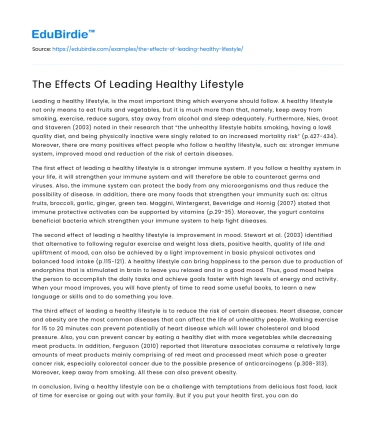Leading a healthy lifestyle, is the most important thing which everyone should follow. A healthy lifestyle not only means to eat fruits and vegetables, but it is much more than that, namely, keep away from smoking, exercise, reduce sugars, stay away from alcohol and sleep adequately. Furthermore, Nies, Groot and Staveren (2003) noted in their research that “the unhealthy lifestyle habits smoking, having a low‐quality diet, and being physically inactive were singly related to an increased mortality risk” (p.427-434). Moreover, there are many positives effect people who follow a healthy lifestyle, such as: stronger immune system, improved mood and reduction of the risk of certain diseases.
The first effect of leading a healthy lifestyle is a stronger immune system. If you follow a healthy system in your life, it will strengthen your immune system and will therefore be able to counteract germs and viruses. Also, the immune system can protect the body from any microorganisms and thus reduce the possibility of disease. In addition, there are many foods that strengthen your immunity such as: citrus fruits, broccoli, garlic, ginger, green tea. Maggini, Wintergerst, Beveridge and Hornig (2007) stated that immune protective activates can be supported by vitamins (p.29-35). Moreover, the yogurt contains beneficial bacteria which strengthen your immune system to help fight diseases.
The second effect of leading a healthy lifestyle is improvement in mood. Stewart et al. (2003) identified that alternative to following regular exercise and weight loss diets, positive health, quality of life and upliftment of mood, can also be achieved by a light improvement in basic physical activates and balanced food intake (p.115-121). A healthy lifestyle can bring happiness to the person due to production of endorphins that is stimulated in brain to leave you relaxed and in a good mood. Thus, good mood helps the person to accomplish the daily tasks and achieve goals faster with high levels of energy and activity. When your mood improves, you will have plenty of time to read some useful books, to learn a new language or skills and to do something you love.
The third effect of leading a healthy lifestyle is to reduce the risk of certain diseases. Heart disease, cancer and obesity are the most common diseases that can affect the life of unhealthy people. Walking exercise for 15 to 20 minutes can prevent potentially of heart disease which will lower cholesterol and blood pressure. Also, you can prevent cancer by eating a healthy diet with more vegetables while decreasing meat products. In addition, Ferguson (2010) reported that literature associates consume a relatively large amounts of meat products mainly comprising of red meat and processed meat which pose a greater cancer risk, especially colorectal cancer due to the possible presence of anticarcinogens (p.308-313). Moreover, keep away from smoking. All these can also prevent obesity.
In conclusion, living a healthy lifestyle can be a challenge with temptations from delicious fast food, lack of time for exercise or going out with your family. But if you put your health first, you can do it! So be careful with your lifestyle and choose what helps promote health and a prosperous life. Lastly, avoid lethargy and procrastination when it comes to exercise, because it will contribute to the beginning of an improved lifestyle.
References
- Ferguson.L.R. (February 2010). Meat and cancer. Meat Science. 84(2) pp.308-313. https://doi.org/10.1016/j.meatsci.2009.06.032
- Maggini.S., Wintergerst.E.S., Beveridge.S. & Hornig.D.H. (October 2007). Selected vitamins and trace elements support immune function by strengthening epithelial barriers and cellular and humoral immune responses. British Journal of Nutrition. 98(S1) pp.29-S35. https://doi.org/10.1017/S0007114507832971
- Nies.A.H., Groot.L.C. & Staveren.W.A. (July 2003). Dietary quality, lifestyle factors and healthy ageing in Europe: the SENECA study. Age and Ageing. 32(4) pp.427–434. https://doi.org/10.1093/ageing/32.4.427
- Stewart, Turner.K.A., Bacher.K.L., DeRegis.A.C., Sung.J.R., Tayback.J.M., Ouyang.M.S., MD .P. (March-April 2003). Are Fitness, Activity, and Fatness Associated with Health-related Quality of Life and Mood in Older Persons? Journal of Cardiopulmonary Rehabilitation. 23(2) pp.115-121. Retrieved from https://journals.lww.com/jcrjournal/Abstract/2003/03000/Are_Fitness,_Activity,_and_Fatness_Associated_With.9.aspx






 Stuck on your essay?
Stuck on your essay?

